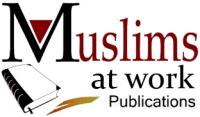| |
|
|
|
|
|
|
|
|
|
|
|
|
|
|
|
|
|
|
|
|
|
|
|
Lesson
21 |
|
|
|
|
|
|
|
|
|
|
|
|
|
|
|
|
|
|
|
|
|
|
|
|
|
|
|
Letters to kings
Islam now began to grow like an
avalanche and showed the signs of assuming vast proportions.
In the sixth year Hijri, on his return from Hudaibiyah, the
Prophet Sallallahu Alaihi Wasallam sent messages to the kings
beyond Arabia inviting them to Islam.
When the Prophet Sallallahu Alaihi
Wasallam expressed the desire to send letters to the kings of
the Arabs and non-Arabs, the Sahabah advised him to affix his
seal on the letters as unsealed letters were not recognised
by kings. The Prophet Sallallahu Alaihi Wasallam accordingly
prepared a silver seal on which was engraved: "Muhammad,
the Messenger of Allah."
|
|
|
|
|
|
|
|
|
|
|
|
|
|
|
|
|
|
|
|
|
|
|
|
|
|
|
 |
|
|
|
|
|
|
|
|
|
|
Seal
of the Prophet Sallallahu Alaihi Wasallam |
|
|
|
|
|
|
|
|
|
|
|
|
|
|
|
|
|
|
|
|
|
|
|
|
|
|
|
|
|
|
Of
the many letters sent by the Prophet Sallallahu Alaihi Wasallam
the following were remarkably significant :
1. Dihya Ibn Khalifa al-Kalbi Radhi
Allahu Anhu was sent to Heraclius, the Byzantine emperor
2. Abdullah Ibn Huzaifah Sahmi Radhi Allahu Anhu was sent to Chosroes
II, the ruler of Persia
3. Hatib Ibn Baltaá Radhi Allahu Anhu was sent to Muqauqis
of Egypt
4. Amr Ibn Umayya Radhi Allahu Anhu was sent to the Negus of Ethiopia.
|
|
|
|
|
|
|
|
|
|
|
|
|
|
|
|
|
|
|
|
|
|
|
|
|
|
|
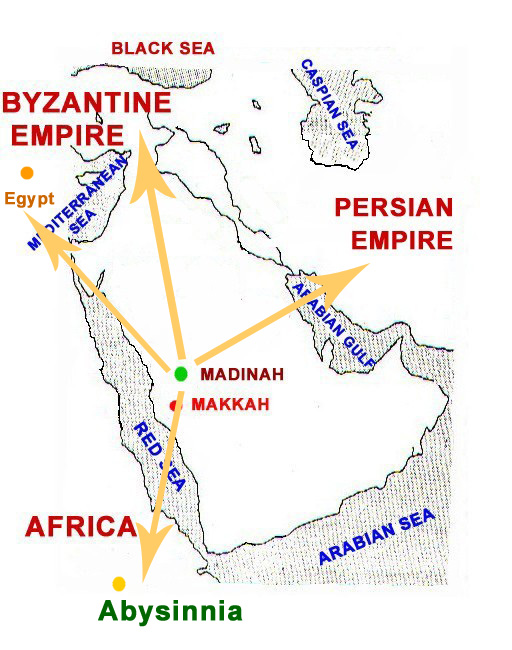 |
|
|
|
|
|
|
|
|
|
|
|
|
|
|
|
|
|
|
|
|
|
|
|
|
|
Letters
to kings |
|
|
|
|
|
|
|
|
|
|
|
|
|
|
|
|
|
|
|
|
|
|
|
|
|
|
|
|
Who were these kings?
We cannot appreciate the gravity
and significance of the memorable step taken by the Prophet
Sallallahu Alaihi Wasallam unless we also know who Heraclius,
Chosroes II, Negus and Muqauqis were. We need to understand
what were the extent of their kingdoms, their prestige,
splendour and might in the world of the seventh century.
For these reasons, it would be worthwhile to give a brief
sketch of the monarchs to whom the Prophet Sallallahu Alaihi
Wasallam sent his messengers.
Herecleus
The Byzantine Empire, then
calling itself 'New Rome' had along with its Iranian counterpart,
kept a tight hand over the civilised world for several hundred
years. Its emperors ruled over vast and populous lands
in Europe, Asia and Africa. The empire was enormously rich
while its powerful armies and navies had a successful military
record.
When the letter of the Prophet
Sallallahu Alaihi Wasallam reached Herecleus inviting him
to embrace Islam he was celebrating his victory over the
Iranian Empire. Great were his exploits and campaigns and
he ruled the greatest empire of the day. In the vastness
of his dominion, wealth and military prowess he could be
compared only with Chosroes II, the emperor of Persia.
Chosroes II
Known as Khusro Parvez to the
Arabs, he was the greatest emperor of Iran. In the East,
his kingdom ran up to the north western parts of India.
During his rule the glory and magnificence of the royal
court had surpassed the limits of normal beauty. Iran was,
during this period, more than a match to any country of
the world in its ostentatious living, luxury of its nobles
and the splendid workmanship of its artisans. In the arts
of its civilisation, new innovations and in the preparations
of edibles and drinks Iran was without any parallel. In
the manufacture of perfumes it had attained perfection.
The people had developed a taste for savoury preparation,
luscious liquors and the finest perfumes. Love of music
had grown into a craze. Chosroes himself was extremely fond
of amassing wealth and artefacts.
Muqauqis
He was the ruler of Alexandria
acting as the governor of Egypt on behalf of the Byzantine
emperor. Egypt was the most fertile dominion of the Byzantine
Empire, far exceeding other provinces in population as well
as in resources. It was also the granary of the Byzantine
capital. When Amr Ibn al Aas Radhi Allahu Anhu entered Egypt
at the head of the conquering Arab force, fourteen years
after the Prophet Sallallahu Alaihi Wasallam had sent his
letter to Muqauqis, he wrote to the leader of the Muslims,
Umar Radhi Allahu Anhu : "The country is exceedingly
fertile and green. Its length covers a journey of one month
and its breadth is about ten days." He also mentioned
that it had 4000 palaces, 4000 baths, 40 000 Jews and 400
theatres for the entertainment of the nobles.
Negus
Ethiopia was a country in the
eastern part of Africa lying on the coast of the Red Sea.
It was then known as Abyssinia. It was also one of the oldest
countries in the world. Abraha, who had led an army to destroy
the Ka'bah in Makkah, was the viceroy in Yemen of the king
of Abyssinia.
Being a sovereign state it
was neither dependent nor a tributary to any alien power.
As a Christian country it had friendly relations with Rome
which was then regarded as the protector of Christendom.
In so far as the Negus to whom
the Prophet Sallallahu Alaihi Wasallam had sent his letter
is concerned, he was, according to Ibn Kathir, the king
who succeeded the Negus who had given asylum to Jafar Ibn
Abi Talib Radhi Allahu Anhu. (1)
|
|
|
|
|
|
|
|
|
|
|
|
|
|
|
|
|
|
|
|
|
|
|
|
|
Content
of the Letters
The content of the letter addressed
to Heraclius was as follows :
"In the name of Allah, the Beneficent,
the Merciful. This letter is from Muhammad, the slave and Messenger
of Allah, to Heraclius, the great King of Rome. Blessed are those
who follow guidance.
Verily, I call you to Islam. Embrace
Islam that you may find peace and Allah will give you a double
reward. If you reject then on you shall rest the sin of your subjects
and followers. 0 people of the book, come to that which is common
between us and you : that we will serve none but Allah, we will
not associate partners with him and not take others as gods besides
Allah. But if you turn away, then tell them to bear witness that
we are Muslims."
|
|
|
|
|
|
|
|
|
|
|
|
|
|
|
|
|
|
|
|
|
|
|
|
|
|
|
|
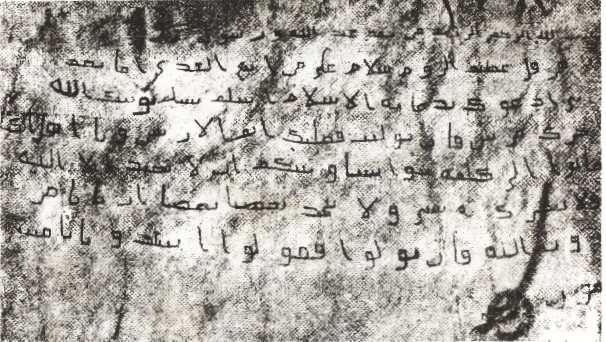 |
|
|
|
|
|
|
|
|
|
|
Letter
sent to Hereclius |
|
|
|
|
|
|
|
|
|
|
|
|
|
|
|
|
|
|
|
|
|
|
|
|
|
|
|
|
|
The
letter sent to the Chosroes read as follows :
"In the name of Allah, the Beneficent,
the Merciful. From Muhammad, the Messenger of Allah to Chosroes,
the great King of Persia.
Peace be upon him who follows guidance,
believes in Allah and His Prophet Sallallahu Alaihi Wasallam,
bears witness that there is no god but Allah and that I am the
prophet of Allah for the entire humanity so that every man alive
is warned of the awe of Allah. Embrace Islam that you may find
peace, otherwise on you shall rest the sin of the Persians."
|
|
|
|
|
|
|
|
|
|
|
|
|
|
|
|
|
|
|
|
|
|
|
|
|
|
|
|
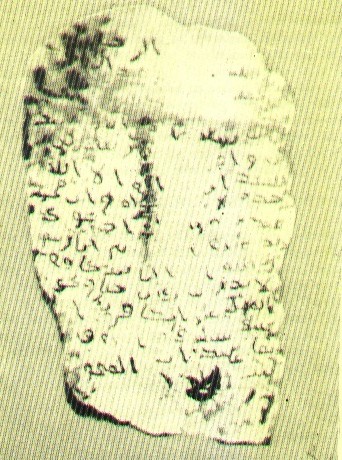 |
|
|
|
|
|
|
|
|
|
|
|
Letter
sent to Chosroes |
|
|
|
|
|
|
|
|
|
|
|
|
|
|
|
|
|
|
|
|
|
|
|
|
|
|
|
|
|
|
|
In
the letter addressed to Negus, the Prophet Sallallahu Alaihi Wasallam
wrote :
"In the name of Allah, the Beneficent,
the Merciful. From Muhammad, the Messenger of Allah to Negus,
the great King of Abyssinia.
Peace be upon him who follows guidance.
Glory be to Allah besides whom there is no god. He is the Sovereign,
the Holy One, the Source of Peace, the Guardian of Faith and the
Protector. I bear witness that Jesus, the son of Mary, is the
Spirit of Allah and His Word which He cast unto Mary, the virgin,
the good and the pure so that she conceived Jesus. Allah created
him from His Spirit and his breathing as He created Adam by His
hand. I call you to Allah, the One without any partner, to His
obedience, to follow me and to believe in that which came to me,
for I am the messenger of Allah. I invite you and your men to
the Mighty, the Sublime. I have accomplished my task of conveying
the message and admonition, so accept my advice. Peace be upon
those who follow guidance." |
|
|
|
|
|
|
|
|
|
|
|
|
|
|
|
|
|
|
|
|
|
|
|
|
|
|
|
 |
|
|
|
|
|
|
|
|
|
|
|
|
Letter
sent to Negus |
|
|
|
|
|
|
|
|
|
|
|
|
|
|
|
|
|
|
|
|
|
|
|
|
|
|
|
|
|
|
|
|
The
letter sent to Muqauqis, the Chief of the Copts of Egypt, read:
"In the name of Allah, the Beneficent,
the Merciful. From Muhammad, the Messenger of Allah to Muqauqis,
the Chief of the Copts.
Peace be upon him who follows guidance.
I call you to Islam that you may find peace and Allah will give
you a double reward. If you reject, then on you shall be the sin
of your countrymen. 0 people of the book, come to that which is
common between us and you : that we will serve none but Allah,
we will not associate partners with him and not take others as
gods besides Allah. But if you turn away, then tell them to bear
witness that we are Muslims." (2) |
|
|
|
|
|
|
|
|
|
|
|
|
|
|
|
|
|
|
|
|
|
|
|
|
|
|
|
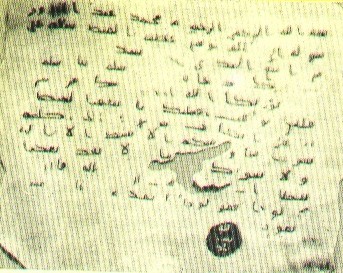 |
|
|
|
|
|
|
|
|
|
|
|
|
|
Letter
sent to Muqauqis |
|
|
|
|
|
|
|
|
|
|
|
|
|
|
|
|
|
|
|
|
|
|
|
|
|
|
|
|
|
|
|
|
|
Reactions
of the kings
Negus and Muqauqis received their
letters from the Prophet Sallallahu Alaihi Wasallam with all due
respect and each gave a courteous reply. They showed the highest
regard to the envoys and Muqauqis even sent gifts to the Prophet
Sallallahu Alaihi Wasallam. These included two slave-girls, one
of whom was Maria who gave birth to the Prophet's Sallallahu Alaihi
Wasallam son, Ibrahim. Negus accepted the message of Islam.
Chosroes II was arrogant and tore
the letter into pieces, saying: "My slave dares to write
to me like this!" He took it as an insult that the name of
Allah and His prophet had been written before his own. When his
reply was conveyed to the Prophet Sallallahu Alaihi Wasallam he
said: "Even so shall Allah shatter his kingdom to pieces."
Chosroes II wrote to Badhan, his
governor in Yemen, to have the Prophet Sallallahu Alaihi Wasallam
sent to him in Ctesiphon. Badhan sent two of his men to Madinah
to accomplish this task. When they arrived in Madinah, the Prophet
Sallallahu Alaihi Wasallam told them that his own son had killed
Chosroes II. The prophecy came true exactly as foretold by him.
In a few years the whole of Iran
lay at the feet of the Muslims. The bulk of the population accepted
Islam and men of such intellect were born in Iran that proved
true, word for word, what the Prophet Sallallahu Alaihi Wasallam
had once remarked:
"If knowledge were to be found
in Pleiads, some of the sons of Persia would attain it."
Heraclius and Abu Sufyaan
Heraclius decided to satisfy himself
about the contents of the Prophet's Sallallahu Alaihi Wasallam
letter. He ordered to search for a man from Arabia who could tell
him about the Prophet Sallallahu Alaihi Wasallam. Abu Sufyaan
happened to be there on a business trip and so he was brought
before him. The questions asked by Heraclius on this occasion
show that he had a deep insight into the scriptures and the teachings
of the prophets. Abu Sufyaan, too, acted like a true Arab for
he considered it below his dignity to tell the emperor anything
but the truth. The conversation between Heraclius and Abu Sufyaan
is significant enough to be quoted here in full:
Heraclius : Tell me about his lineage.
Abu Sufyaan : He is of the best lineage.
Heraclius: Did anybody before him make the claim he does?
Abu Sufyaan: No.
Heraclius: Has there been any king in his family?
Abu Sufyaan: No.
Heraclius: Who follows him? Are they the poor and weak or the
nobles?
Abu Sufyaan: They are all poor and weak.
Heraclius: Are his followers increasing or are they deserting
him?
Abu Sufyaan : Their numbers are growing.
Heraclius: Do those who enter his religion despise and leave him?
Abu Sufyaan: No.
Heraclius: Did you find him telling lies before he made this claim?
Abu Sufyaan: No.
Heraclius: Did he ever break his promise?
Abu Sufyaan: Not as yet, but we have to see what he does in future.
Heraclius: Did you ever fight against him?
Abu Sufyaan: Yes.
Heraclius: What was the result?
Abu Sufyaan: The fortunes have varied, sometimes in our favour,
sometimes in his.
Heraclius: What does he teach?
Abu Sufyaan: He asks to worship one Allah, not to associate any
partners with Him, to offer prayers, to be virtuous, to speak
the truth and to be kind to people.
Heraclius than told the interpreter
to tell Abu Sufyaan:
"I asked you about his lineage
and you replied that it was the noblest among you. Prophets always
come from the best lineage. I asked you if any man in his family
had made a similar claim and your reply was 'no.' If anybody had
made a claim to prophethood in his family, I would have thought
that he was imitating him. Then I asked if there had been a king
in his family, and you said 'no.' Had it been so, I would have
surmised that he was trying to recover his lost kingdom. I enquired
if you knew him to be untruthful before making the claim and you
said 'no.' I know that it is not possible for a man to be truthful
to the people but to mince the truth with regards to Allah. Then
I asked you if his followers were drawn from the people of rank
and distinction or they were the poor and the weak and you replied
that they were humble and meek. Prophets are always followed by
the humble and poor in the beginning. And I asked if his followers
were increasing and you said that they were gaining in numbers.
Faith is always like that. It goes on increasing until it is triumphant.
Then I asked if anybody had turned away from him and rejected
his faith and your reply was 'no.' Faith once settled in the heart
never leaves it. And then I asked if he ever broke his word and
you said 'no.' Prophets never break their promises. Then I asked
about his teachings and you told me that he asked you to worship
one Allah, not to associate any partners with Him, to turn away
from the idols, to speak the truth, to be virtuous and to glorify
the Lord. Now, if you have told me the truth about him he will
conquer the ground that is beneath my feet. I knew that a prophet
was about to be born but I had never thought that he would come
from Arabia. If it had been possible I would have called upon
him, and if I had been with him, I would have washed his feet."
(3)
Heraclius after discussion with his
chiefs and courtiers did not accept Islam. He had seen the light
but lost the golden opportunity. He gave preference to his kingdom
over the eternal truth. In consequence, he lost his kingdom after
a few years during the time of Umar Radhi Allahu Anhu.
Letters to the Arab Leaders
The Prophet Sallallahu Alaiahi Wasallam
also sent letters to the rulers of Bahrain, Oman, Yamama and other
states. Some accepted while others did not. Haudha Ibn Ali wrote
that he would accept Islam provided he was allowed to share the
dominion with the Muslims. The Prophet Sallallahu Alaihi Wasallam
turned down his request and he died soon thereafter. Harith Ghassani
was enraged with the letter and prepared an army to fight the
Muslims. (4) |
|
|
|
|
|
|
|
|
|
|
|
|
|
|
|
|
|
|
|
|
|
|
|
|
|
|
Lessons
to learn
-
The sparkling
testimony given by Abu Sufyaan, the avowed enemy of the Prophet
Sallallahu Alaihi Wasallam, spoke volumes about the personal
excellence of the Prophet's Sallallahu Alaihi Wasallam character
and morals.
|
|
|
|
|
|
|
|
|
|
|
|
|
|
|
|
|
|
|
|
|
|
|
|
|
|
|
|
|
_________________________________________
(1) Nadwi,
Syed Ab al-Hasan Ali, Muhammad Rasulullah, Lucknow,
1982, p. 285
(2)
Mubarakpuri, Safi-ur-Rahman, Ar-Raheeq Al-Makhtum,
Riyadh, 2000, p. 353
(3) Nadwi,
Syed Ab al-Hasan Ali, Muhammad Rasulullah, Lucknow,
1982, p. 288
(4) Nadwi,
Syed Ab al-Hasan Ali, Muhammad Rasulullah, Lucknow,
1982, p. 294
________________________________________
|
|
|
|
|
|
|
|
|
Dua
when in fear
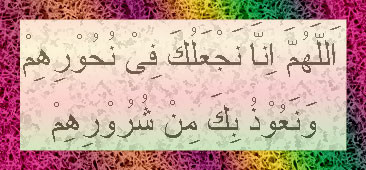
|
Sunnah
It
is not permissible for a Muslim to create fear in another Muslim. |
|
|
|
|
|
|
|
|
|
|
|
|
|
|
|
|
|
|
|
|
|
|
|
|
|
|
|

